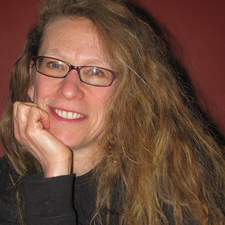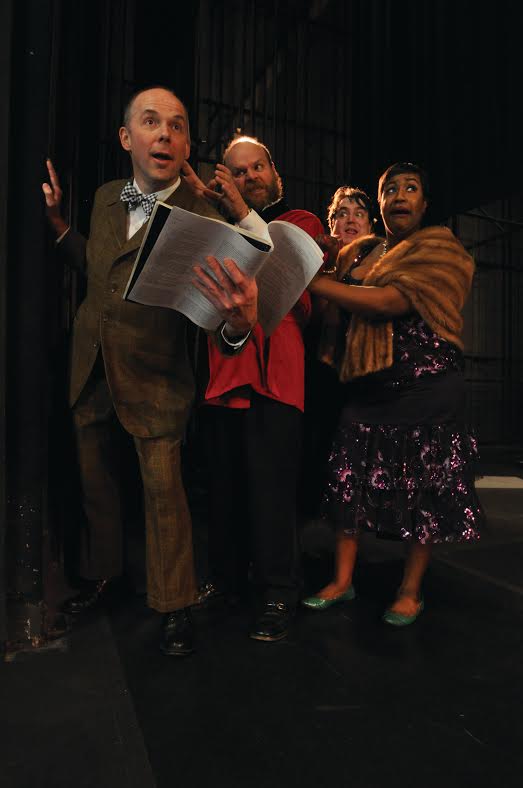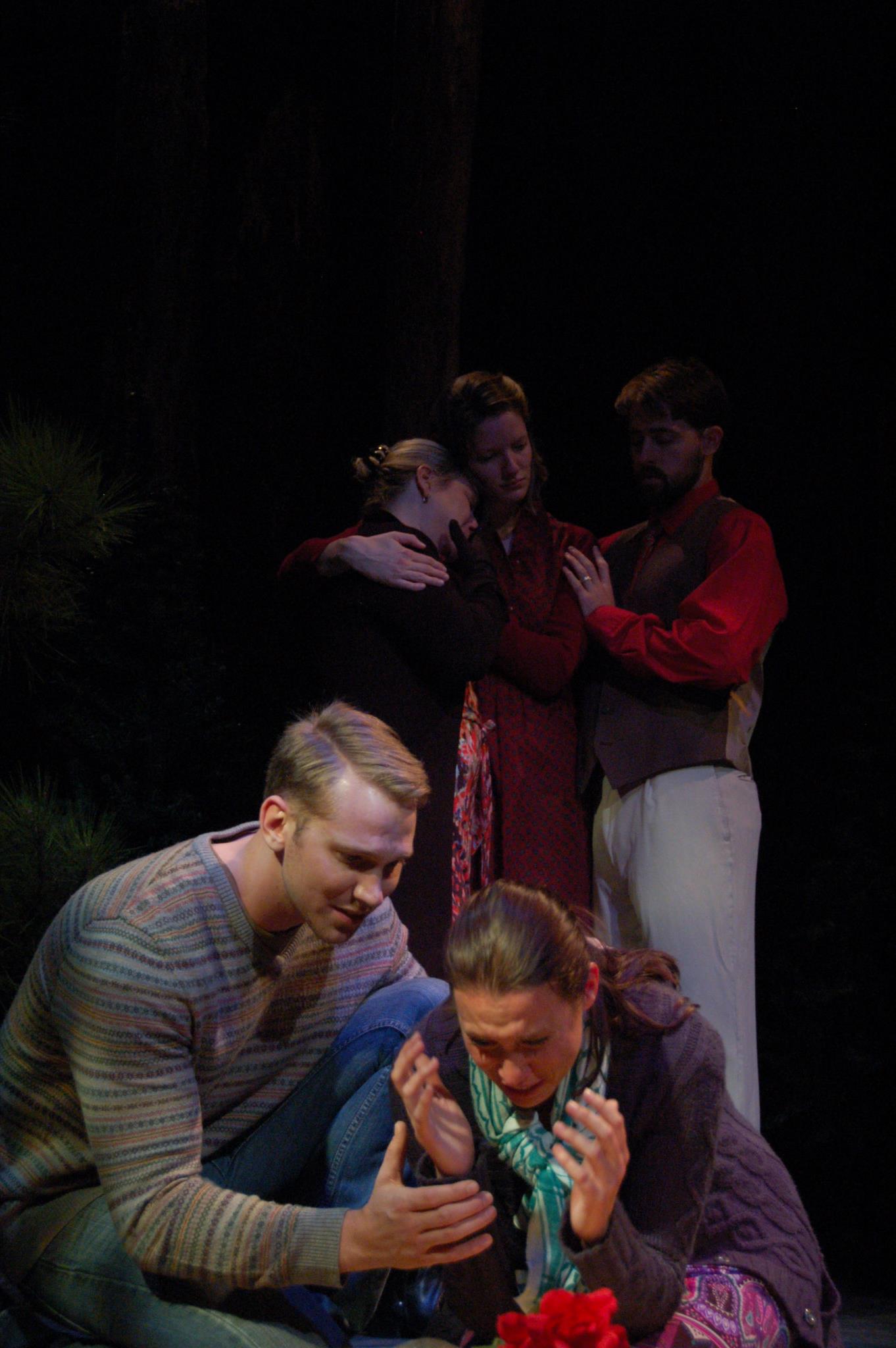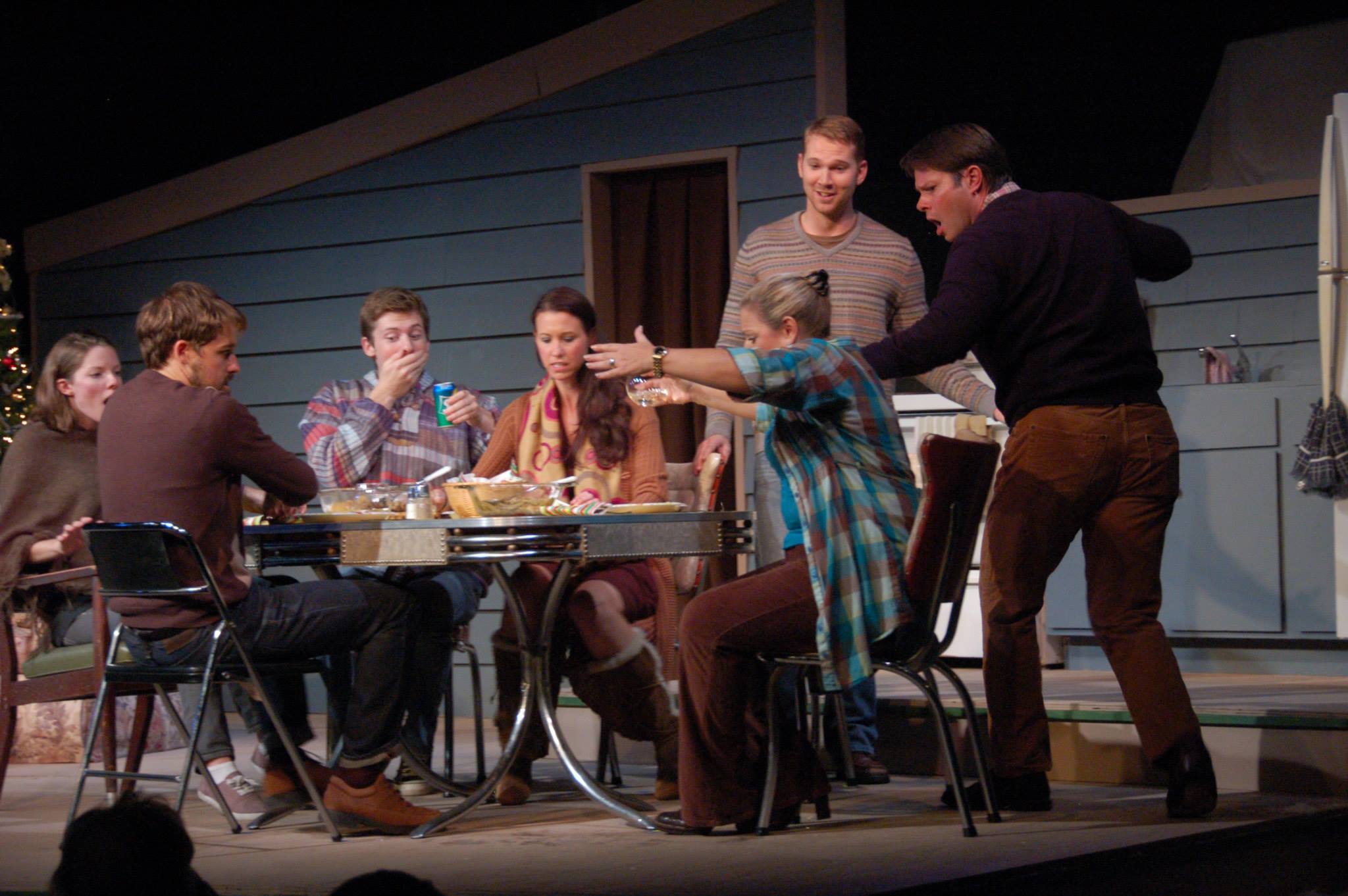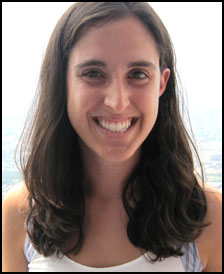You know how this will end. You know when you meet her that Amelia, a thirty-something emotional shut-in, will journey from estrangement to engagement. And still, in the closing moments of Anatomy of a Hug, when all of the obvious signs have directed you to that inevitable conclusion, you are thrilled. Kat Ramsburg’s original script is the most engaging Trustus Playwrights’ Festival winner in recent memory and makes for a powerful evening of theatre.
The play ends, as it must, of course it must, with an embrace. But not the one you think, and not the one on the playbill, where Dewey Scott-Wiley, as Sonia, a dying ex-con, hugs daughter Amelia, played by Rebecca Herring. The play begins as these two are reunited through a Compassionate Release program, owing to the former’s late-stage ovarian cancer. Sonia functions through the rest of the play as an hourglass: we sense, as her condition diminishes, the denouement quickly approaching.
And so there is an urgency to the action: the play, you feel, must hurry up to solve the riddle of Amelia. But it doesn’t. Instead, Ramsburg exploits that urgency by patiently and methodically assembling her characters, and Herring quite marvelously inhabits a young woman suffering from technology-induced autism. Her mother having spent twenty-six years in prison for killing her father, Amelia has been shunted from one foster home to another. Along the way, she has counted on television to provide her with a social circle and a recognizable (or at least predictable) plotline. Her extensive DVD collection is full of friends she can “check in with” and who are “always there when you need them.” In a particular touching revelation, we learn that it was TV’s Roseann who told her about menstruation and that Sex and The City’s Aidan was her first boyfriend.
As a Save The Children-style telemarketer, Amelia is quite adept at constructing compelling narratives that convince strangers to “adopt” children in Burundi for only $35 a month. She is so earnest and knows so little of real emotional intimacy that she can, without the slightest sense of irony, peddle children half-a-world away. It’s only when a co-worker, Ben, begins courting her that we see how lost she is. Her problem is not that she has walls; she has nothing to build them with. She simply doesn’t know how to be. As she tells Ben, “I don’t have any other stories” than the ones she lives through on TV.
Ben is played here by Patrick Michael Kelly in an affecting return to Trustus’ stage after several years in New York, and in Ben’s trajectory we sense the underpinnings of the production itself. In the early going, he bumbles onstage like The Honeymooners’ Ed Norton. He is, well, cartoonish—or as Amelia calls him, “like someone in a sitcom—there’s something not quite real about you.” And that’s because there’s nothing quite real about the staging.
Director Chad Henderson, along with some inventive scene, sound, and lighting design by Baxter Engle and Marc Hurst, plays Brecht for us. The backdrop is a test-pattern, the lights are exposed, and we assume the role of a studio audience even to the extent that we are instructed (by electronic light boards) when to applaud and laugh. At first, that conceit doesn’t work. It pushes us—Brecht would say alienates us—out of the play itself. We are asked to laugh at lines that aren’t that funny, to applaud beats that don’t deserve it. We are placed, that is, in an emotionally-manufactured setting where we simply don’t know if our responses are appropriate.
Just like Amelia.
Along the way, though, the production changes just as Ben does. Kelly plays Ben as two people: an irritating, schmaltzy showman protecting someone much more wounded and sincere. About the time we discover ourselves warming up to him, we notice also that our responses aren’t being coached anymore: all the studio trappings have fallen away, and we have been allowed into the world of the play.
Sure there are problems, there must always be problems. Some may find the television studio elements too intrusive. While Brecht insisted that we must always be shown that we are being shown something, his best plays often ignored that advice. As Sonia, the catalyst for Amelia’s ultimate emotional re-integration, Scott-Wiley’s not given much to do except break the damned TV and die (which she does quite movingly. The woman sitting next to me was downright weepy.) And the story she tells about the murder charge that landed her a life-sentence doesn’t quite add up; it sounds more like vehicular manslaughter, the sort of thing you could plea-bargain out of, particularly if you have a daughter who needs you.
And there are times when Ramsburg forgets the thing she does best: knowing what to leave out. She is very good at minimizing exposition and keeping us Here In This Moment, but through the latter third of the play—as Amelia finds her voice—I felt I was once again being coached on how to feel and respond. Still, the writing here is very assured, and Ramsburg’s play is a threnody for those like Amelia crippled by a culture that artificializes family and belonging and what Arthur Miller called the congealments of warmth.
If the opening night standing ovation is any indication, Trustus’ production has done it considerable justice. Herring’s Amelia is someone we know better than she knows herself, and that’s some trick. As a woman destroyed by disease and hallucinating on painkillers and flashbacks, Sonia is lucky to have Scott-Wiley. Kelly’s Ben shows us a broken man trying hard to be someone more charming and charismatic than he really is. And Iris—well, Iris is difficult in that she is a primarily just a functionary, equal parts social worker, DOC case manager, and hospice nurse. But Annette Grevious ably humanizes her and establishes a presence that quilts these torn pieces together.
At bottom, Anatomy of a Hug is a boy meets/gets/loses/gets girl story. Like many modern plays, this play gives us two quirky lovers fighting through the obstacles within and without and arriving at last in each other’s arms. And yet it feels new. It allows us to identify with that part of our psyche that is permanently awkward or stunted or doesn’t know what to do with its hands, and, in the end, it grants us compassionate release.
Jon Tuttle is Professor of English at Francis Marion University and former Literary Manager at Trustus Theatre, which has produced five of his plays.








